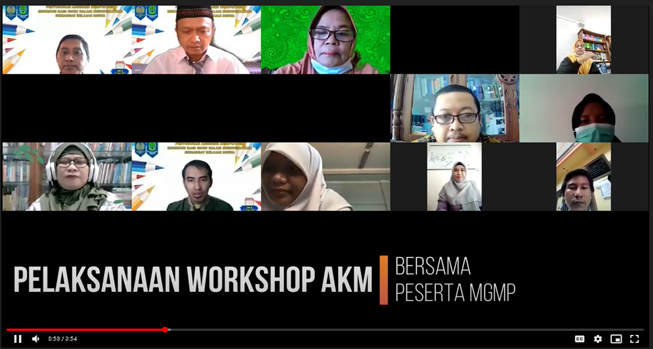Teacher literacy skills through minimum competency assessment training
DOI:
https://doi.org/10.22219/jcse.v3i2.18917Keywords:
Assessment , Literacy skills, NumeracyAbstract
Improving the education evaluation system is part of the independent learning policy aiming at encouraging the improvement of quality of learning and learning outcomes in Indonesia. The Ministry of Education and Culture of Indonesia plans the implementation of a national assessment in 2021. Changes to this national assessment evaluate students’ competence and map the education system in the form of inputs, processes, and results that will be achieved. Thus, assessment is no longer an individual assessment. In order to accelerate the improvement of the quality of Indonesian Education, it is necessary to reflect both from the relevant agencies and school agencies as the main actors in the assessment. Based on this thought, it is necessary to carry out training for teachers in compiling AKM problems. The purpose of this study is to find out the implementation of training in preparing minimum competency assessments for teachers, whether there is an increase in teacher literacy skills, and how teachers respond through teacher training. The research method implemented was qualitative descriptive analysis with three stages: preparation, implementation, and evaluation. The results of the minimum competency assessment of teachers are assessed based on the results of the development of AKM MGMP teachers in Surabaya obtained 86% increased results. Training obtained by each MGMP teacher based on the results of AKM workshops were known to be 3 participants gained significant results, it was 38%-46%, while seven other participants ranging from 4%-8% experienced an increase. These results show the success of AKM training activities for teachers. The results of the trainee response provide good and excellent feedback.
Downloads
References
Anugrah, D. (2020). Dinamika pembelajaran daring di tengah pandemi Covid-19 http://beritamagelang.id/kolom/dinamika-pembelajaran-daring-di-tengah-pandemi-covid-19.
Adom, D., Adu-Mensah, J. D. D. (2020). Test, measurement and use of the Concepts in Education, IJERE, 9. https://doi.org/10.11591/ijere.v9il.20457
Arikunto, S. (2009). Dasar-dasar evaluasi pendidikan. Bumi Aksara.
Mulbar, U., & Bahri, A. (2021). Scientific literacy skills of students: Problem of biology teaching in junior high school in South Sulawesi, Indonesia. International Journal of Instruction, 14(3), 847-860.
Novita, N. & Mellyzar, H. (2021) Asesmen Nasional (AN): Pengetahuan dan persepsi calon guru. Jurnal Ilmu sosial dan Pendidikan, 5(1), 172-179. http://ejournal.mandalanursa.org/index.php/JISIP/index
Ni'mah, F. (2019). Research trends of scientific literacy in Indonesia: Where are we? Jurnal Inovasi Pendidikan IPA, 5(1), 23-30.
Oktiningrum, W., Zulkardi, Z., & Hartono, Y. (2016). Developing PISA-like mathematics task with Indonesia natural and cultural heritage as context to assess students mathematical literacy. Journal on Mathematics Education, 7(1), 1-8.
Rachmatullah, A., Diana, S., & Rustaman, N. Y. (2016, February). Profile of middle school students on scientific literacy achievements by using scientific literacy assessments (SLA). In AIP Conference Proceedings (Vol. 1708, No. 1, p. 080008). AIP Publishing LLC.
Rusilowati, A., Kurniawati, L., Nugroho, S. E., & Widiyatmoko, A. (2016). Developing an Instrument of Scientific Literacy Assessment on the Cycle Theme. International Journal of Environmental and Science Education, 11(12), 5718-5727.
Sadler, T. D., & Zeidler, D. L. (2009). Scientific literacy, PISA, and socioscientific discourse: Assessment for progressive aims of science education. Journal of Research in Science Teaching: The Official Journal of the National Association for Research in Science Teaching, 46(8), 909-921.
Syahrul, S. (2010). Pengembangan model asesmen kompetensi siswa SMK dalam Pengembangan Konteks Pembelajaran Kinerja di Industri. Jurnal Penelitian dan Evaluasi Pendidikan, 14(2), 246-268.
You, H. S., Park, S., & Delgado, C. (2021). A closer look at US schools: What characteristics are associated with scientific literacy? A multivariate multilevel analysis using PISA 2015. Science Education, 105(2), 406-437.

Downloads
Published
How to Cite
Issue
Section
License
Copyright (c) 2021 Pramita Yakub, Ahmad Bashri, Sifak Indana, R. Raharjo

This work is licensed under a Creative Commons Attribution-ShareAlike 4.0 International License.












